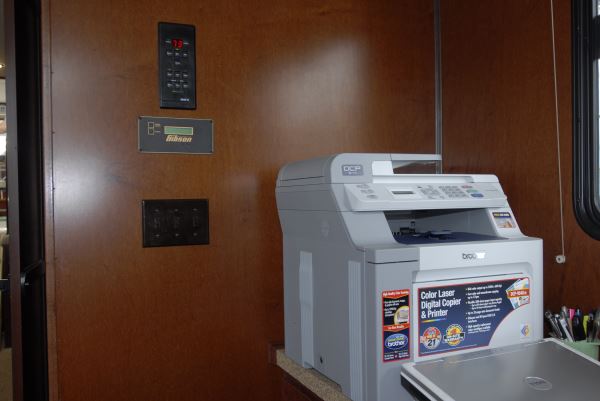
Julian Block, a tax attorney in Larchmont N.Y., believes in taking every honest tax break in the book. However, today’s tax codes are so complex, even experts get stumped. Block finds that court decisions often rule against the IRS, in favor of the taxpayer. It may pay to get a second opinion.
Block’s latest book, Julian Block’s Tax Deductible Travel and Moving Expenses (PassKey Publications), isn’t a boating book but you may be blown away by how much of it applies to houseboat life.
While neither this column nor this magazine give tax advice, we encourage you to start asking questions, keeping records, watching the tax code and conferring with your own tax advisors. Block’s book covers travel and moving expenses such as moving to a new job, moving to seek a job, business travel, medical travel and volunteer travel.
If you’re a liveaboard with no other home, your tax situation is different from that of other houseboat owners. After all, you can’t deduct for such things as “meals away from home” if the houseboat is home. If you live and work onboard, your situation is different from that of the person who lives at home and works onboard, and different again from houseboaters who neither live nor work onboard, but who use the boat in their Boy Scout work or for business entertaining. Consider:
 * You are a self-employed, freelance consultant, living aboard your houseboat in San Francisco, Calif. You fly to New York to meet with clients. Like any other businessperson, you deduct the cost of the flight, hotel and meals. Is your houseboat “office” expense deductible? Ask your tax professional.
* You are a self-employed, freelance consultant, living aboard your houseboat in San Francisco, Calif. You fly to New York to meet with clients. Like any other businessperson, you deduct the cost of the flight, hotel and meals. Is your houseboat “office” expense deductible? Ask your tax professional.
* You’re a carpenter who lives on your houseboat in Seattle, Wash. You get a winter construction job in San Diego, Calif., and decide to motor on down the coast for the season. Deductible? Code Section 217 describes different length-of-the-job rules for people who are employed and another for the self-employed.
* You live on your houseboat in New Jersey. Your company moves to Boca Raton, Fla., and invites you to move with them, but at your own expense. Taking the houseboat south, you leave the boat in a marina in Daytona Beach, Fla., and spend a week with your family at Walt Disney World before resuming your trip. The cost of moving the houseboat may be deductible, but not the side trip to Orlando.
* One key stipulation in deducting the cost of a move is that the new job must be at least 50 miles from the old one. That means workplace to workplace, not marina to marina.
* Your employer is moving the company upriver more than 100 miles from Jacksonville, Fla., to Sanford. The boss says you can stay with the company but must move your “home” and personal effects at your own expense. If you’re a liveaboard, expenses may be deductible (if you meet other considerations such as having been with the company a minimum length of time). However, if you move off the boat to a house and the houseboat is a “personal effect,” the IRS may balk at the deduction for moving the boat.
* You and your family live onboard and your special needs child needs special schooling. Different rules apply if the school is unique (e.g. a school for the deaf) or if the child is mainstreamed in a public school. Rules are also different for a liveaboard who must move the boat to a new location solely for the handicapped child’s well-being and for the liveaboard who must transport the child each day from the marina to a special school.
* Block points out that Revenue Rulings 72-226 and 73-325 allow medical deductions for meals and lodging for alcohol and drug treatment and for transportation costs to AA or Narcotics Anonymous.
 * Deducting costs of a permanent move for medical reasons is very iffy, but you may be able to deduct some expenses. There’s a good chance you have a deduction if you have to adapt your floating home to accommodate a physical disability, e.g. a roll-in shower.
* Deducting costs of a permanent move for medical reasons is very iffy, but you may be able to deduct some expenses. There’s a good chance you have a deduction if you have to adapt your floating home to accommodate a physical disability, e.g. a roll-in shower.
* On Take a Kid Fishing Day, you volunteer with Big Brothers to take half a dozen boys out on your houseboat. Keep track of all costs for fuel, food, bait and so on and consider taking a charitable deduction.
* According to Block, changes to the Internal Revenue Code have averaged one per day for the past eight years! One way to get current, professional advice from a non-IRS source is to go to www.keen.com. Experts set their own fees, offering advice by phone.
* Don’t be afraid to ask. As a full-timer or part-time houseboater, you may be sitting on tax savings you never dreamed possible.
The above topics were meant only as reminders. See the book, and then consult your own tax professional about deductions and how to document them.
About the Authors
Gordon and Janet Groene lived full-time on the go for ten years. Their books include Living Aboard and Creating Comfort Afloat. Janet posts new galley recipes weekly at www.BoatCook.blogspot.com.